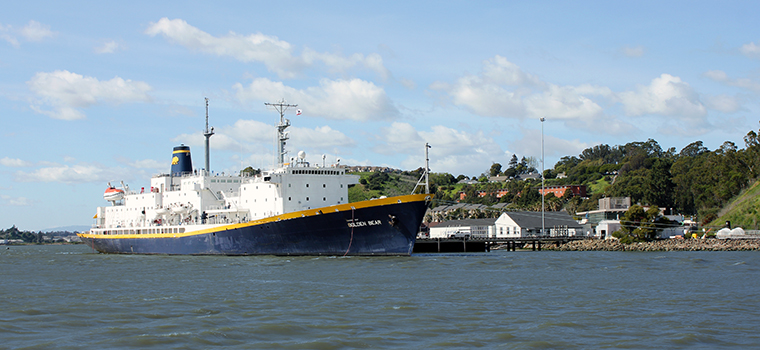Given that the Bay Area is home to world-class technology and innovation, it's not surprising that the Port of Oakland has embraced the latest technology to deliver advances in logistics and supply chain management.

Many California Maritime Academy cadets spend their summer at sea aboard the legendary Golden Bear, a primary training platform where technological skills learned in the classroom are applied. Photo courtesy of Cal Maritime
BY PATRICK BURNSON
Published: June, 2018
Given that the Bay Area is home to world-class technology and innovation, it’s not surprising that the Port of Oakland has embraced the latest technology to deliver advances in logistics and supply chain management.
Late last month, a one-stop, online gateway to the port went live, providing shippers with a single virtual point of entry to all of its operations. This platform is believed to be an industry first in the quest to digitize containerized cargo transportation.
“This is what our industry is asking for,” said Port of Oakland Maritime Director John Driscoll. “We’re providing a comprehensive digital view of ships, cargo and terminal information all in one place on digital devices—no more clicking through multiple websites.”
The Oakland portal is thought to be the first digital collaboration platform that aggregates shipping information from every marine terminal in a harbor. Terminals are where ships, trucks and trains converge to transport the world’s containerized trade. The port said the Oakland portal consolidates information from Oakland’s four active marine terminals. The data include:
• vessel schedules;
• cargo status; and
• live views of Port thoroughfares.
The features are available to all users, the port said. Additional specialized functions such as paying terminal fees, cargo status updates, and trucker appointments are available with registration and a login.
A future iteration plans to incorporate real-time performance metrics and dashboards customized for the various portal users such as motor carriers and cargo owners, the port said. The port expects to provide these additional upgrades in early 2019.
The port said supply chain operators will better manage trade flow with the portal in place. For instance, cargo owners will know with greater precision when to expect merchandise. Trucking companies will know exactly when and where to dispatch drivers for container pickup. New Jersey-based logistics software provider Advent Intermodal Solutions created the Oakland Portal as an extension of its customer-based eModal system.
Many ports nationwide are contemplating digital platforms and are looking to Oakland to see how the system works in practice. Online portals are a response to supply chain operators who have expressed concerns about the difficulty of tracking their containerized cargo door to door.
Cal Maritime’s Training Ship, Golden Bear, Departs on Its Summer Voyage
The 500-foot-long Golden Bear voyages during the summer from its home in Vallejo to ports in the Pacific, Caribbean, and Atlantic before returning to Vallejo.
During its voyages, hundreds of Cal Maritime students run the ship while overseen by licensed deck officers and licensed engineers. They also take courses while underway, perform ship maintenance at sea and in port, and have free time in each port. During May and June 2018, the Golden Bear itinerary includes Western Samoa, the Solomon Islands, Saipan and Maui before San Diego and, finally, back to Vallejo.
For more information, see www.csum.edu.
Industry Celebrates National Maritime Day
Tim Cole, president of the Pacific Transportation Association (PTA), reminded members of an important date in a letter last month: “On May 22, the American maritime industry celebrates National Maritime Day, which was designated by Congress in 1933 to recognize America’s maritime industry and its merchant mariners. Congress selected May 22 to commemorate the American steam/sailing ship Savannah’s voyage from the United States to England, the first successful crossing of the Atlantic Ocean using steam propulsion.
“The day has since evolved into an opportunity to recognize all American mariners, especially those who gave their lives for their country in time of war. Of the 250,000 members of the U.S. Merchant Marine who served in World War II, 6,700 perished—a higher wartime casualty rate than that suffered in any of the armed forces. The Pacific Transportation Association salutes our U.S. merchant mariners who defend our maritime borders, foster travel and tourism, and promote global trade.”
The letter also announced the PTA’s “Ports and Terminals” luncheon to be staged in Jack London Square on June 27. Featured speakers include Chris Lytle, executive director of the Port of Oakland; Mario Cordero, executive director of the Port of Long Beach; and John McLaurin, president of the Pacific Merchant Shipping Association.
For more information, see www.pacifictrans.org.
Patrick Burnson is the executive editor of Logistics Management. www.logisticsmgmt.com

